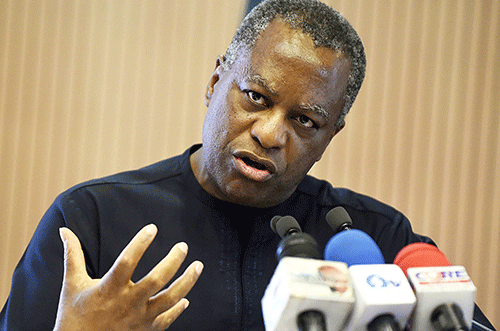Outgoing public enterprises minister Leon Jooste yesterday fell short of announcing his immediate plans after resigning from both Cabinet and parliament. The Presidency confirmed Jooste’s resignation yesterday afternoon.
“Multiple plans. But not immediately. I first need to restore my family after being an absent husband and father for the past 2 567 days,” Jooste briefly told New Era.
The resignation comes at the back of a Cabinet decision last year that the ministry of public enterprises be transformed into a department under the ambit of the finance ministry, in line with a recommendation by the High-Level Panel on the Namibian Economy (HLPNE).
In a statement, the Presidency said Jooste had already informed President Hage Geingob on 15 March 2022 of his intentions to relinquish his position at the end of this month.
“Minister Jooste further informed that he would also tender his resignation as a member of parliament the same day,” the Presidency said, adding that the outgoing minister has conveyed an availability to serve the nation in other roles. “Accepting the resignation of Honourable Jooste, President Geingob lauded the valuable contributions of the outgoing minister in setting up the Ministry of Public Enterprises, and leading the ministry with dedication. Also, President Geingob thanked Honourable Jooste for his determination in ensuring reforms of public enterprises through the enactment of the Public Enterprises Governance Act of 2019, including the successful conclusion of the mission of the ministry.” Jooste served as deputy minister of regional and local government from 2004 to 2005, and deputy minister of tourism from 2005 to 2009. In 2015, he was appointed by Geingob as minister of public enterprises. He was reappointed to the same portfolio in March 2020. At the same time, Geingob had already hinted the ministry would be dissolved within his current and final term as head of state. In a statement in November last year, Jooste praised the decision to convert the public enterprises ministry into a department within the ministry of finance, saying shareholder functions would be greatly enhanced under the consolidation. “This will also allow the Ministry of Finance to take control of and be directly involved in the process leading to the establishment of the holding company, thereby creating critical institutional memory of the actual details of the process,” Jooste said. He added that the decision was “based on technical facts and strategic rationale, where the consolidation and streamlining of operational processes will inevitably result in substantial cost-savings since a separate ministry will no longer have to be maintained. I am entirely convinced that this decision is in the best interest of the nation and the government, and that no momentum will be lost in our collective quest to transform the Namibian public enterprises”. A hybrid governance model for public enterprises, approved by Cabinet in 2015, separated the role of the State as policy formulator, regulator and operator by centralising the ownership of commercial public enterprises under the Ministry of Public Enterprises, while non-commercial public enterprises resorted under the various line ministries as well as extra-budgetary funds under the finance ministry. “This model has proven to be extremely effective, with Singapore and Malaysia serving as early adopters, where a central holding company that becomes owner of all commercial public enterprises is established and reports to the Minister of Finance, in line with the provisions of the State Finance Act. The establishment of a holding company governance model was also recently recommended by the High-Level Panel on the Namibian Economy and endorsed by Cabinet as one of the approved recommendations,” Jooste explained.
ktjitemisa@nepc.com.na



